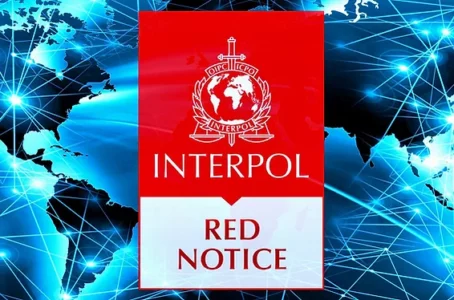
Interpol Wanted Person Diffusion
To accelerate international cooperation in combating transnational crime, Interpol has established an effective alert system, which consists of several types of notifications. Annually, the Interpol system registers thousands of notifications, a significant portion of which do not meet the acceptance criteria and are deleted by the CCF Commission.

For instance, in 2023, there were 10,271 red notices and 11,709 diffusions issued. However, determining the exact number of published diffusions is extremely difficult because they are less formalized and are sent directly to individual countries upon request, often bypassing a thorough verification process.
If you suspect that you are the subject of an Interpol diffusion, do not hesitate to contact our team of experienced Interpol lawyers. Reliable legal support can help you achieve the removal of such a notice and avoid unwanted legal consequences, including arrest or detention at airports.

What is an Interpol Red Notice?
An Interpol Diffusion is an international request for the search and arrest of individuals, which is sent directly from one or several countries to other countries via the I-24/7 communication system without prior approval from the organization’s General Secretariat. Diffusions function similarly to Interpol notices but are less formalized and disseminated more quickly.
Diffusions are used in the following cases:
- Urgent situations requiring immediate action, when there is no time for the formal issuance of a Red Notice and approval from the General Secretariat;
- Local or regional enquiries relating to a limited number of countries;
- Addition to color notifications for providing case updates or additional information.
A member country of Interpol, in need of assistance from other countries in arresting, locating, or gathering information about a specific individual or entity, can initiate a diffusion. This is done through the National Central Bureau (NCB) of Interpol in that country.
Diffusions are sent through Interpol’s secure communication system known as I-24/7. The sender can choose which countries to send the diffusion to: all member countries or specific selected states.
Diffusion contains information about the person or object being sought.
- Identification data: name, date of birth, nationality, photographs, and fingerprints.
- Legal basis: description of the crime, references to the relevant legislative articles;
- Requested actions: detention, surveillance, gathering additional information, etc.
Countries that have received a diffusion can take measures to detain the person sought, assist in gathering information, or refuse to comply with the request at their discretion.
What are the Types of Interpol Notices?
To exchange information about criminals, suspects, missing persons, and threats in real-time, Interpol uses a notification system that covers 195 member countries of the Organisation. Each type of notification has its own functions and purpose.
Red notice
The Red Notice is the most common and serious type of alert issued by Interpol. It is issued to seek the location and provisional arrest of individuals wanted for prosecution or to serve a sentence. A Red Notice serves as an international request for arrest with the aim of extradition. It contains detailed information about the person sought, including charges, photographs, fingerprints, and other identifying details.
Blue notification
The Blue Notice is used for establishing the whereabouts, identification, or obtaining information about individuals related to criminal cases. Thanks to blue cards, law enforcement agencies can gain additional information about suspects, witnesses, or victims. This notification helps establish the identity or location of a person for the continuation of the investigation.
Black notification
A black notice is used to identify unidentified bodies. This is important for crime investigation and notifying next of kin.
Yellow notification
Yellow alerts are used to locate missing vulnerable individuals who are unable to identify themselves. These may include children, the elderly, or those with mental health conditions. The alert disseminates information that can assist in their discovery and return to their loved ones.
Orange alert
Orange notifications disseminate information about serious threats to public safety. These could be warnings about terrorist acts, dangerous criminals, explosive devices, or other potential risks.
Purple notification
Purple notifications allow law enforcement agencies to share information about new or unique methods of committing crimes. This helps to increase awareness and develop strategies to counter criminal activity.
Green notification
Green notifications help inform Interpol member countries about individuals who have been convicted or released from custody and may commit a crime in another country. This allows law enforcement agencies to take preventive measures to protect society.
Silver notification
In an effort to combat money laundering and illegal financial flows, Interpol has developed a concept. Silver notification It should “stimulate global efforts to combat economic crimes, significantly complicating money laundering for criminals.” Recently, the launch of a pilot project to test the Silver Alert has been approved.
The idea of the Silver Alert emerged back in 2015 following the widespread adoption of virtual assets and their mass use for the purpose of concealing criminal proceeds. At that time, law enforcement agencies were only able to intercept about 3-5% of illegal financial flows.
The project remained inactive until 2022, at which point a working group of experts was appointed to assess its viability. The start of the pilot scheme is scheduled for January 2025, and it will last for two years. Initially, only Interpol itself will have the authority to issue silver alerts at the request of the national police.
Special Interpol Notice of the UN Security Council
This notice is a joint initiative of Interpol and the United Nations Security Council. It is aimed at enforcing international sanctions against individuals and organizations involved in terrorist activities, financing terrorism, or the proliferation of weapons of mass destruction. The special notice contains detailed information that assists Interpol member countries in identifying such individuals or organizations and taking appropriate measures, including freezing assets and imposing travel restrictions.
What is the difference between Interpol Diffusion and Red Notice?
The main difference between an Interpol diffusion and a red notice lies in the level of formality. A red notice is issued through Interpol’s General Secretariat after undergoing a review for compliance with the organization’s legal and human rights standards. A diffusion, on the other hand, is sent directly from one country to other countries or a selected group of countries without necessarily going through the General Secretariat. This allows for quicker dissemination of information, but diffusions do not always undergo a review for compliance with Interpol’s standards.
Additionally, a Red Notice is automatically distributed to all Interpol member countries, while diffusions are sent to specific selected states.
Red notices are published on the official Interpol website and are accessible to the public. Diffusions, however, are internal alerts and are usually not available to a wide audience, as they are distributed through private communication channels among member countries.
A Red Notice is used when there is a need to officially declare an international search for a person with the aim of their arrest and extradition. Diffusion is applied when it’s necessary to urgently disseminate information without delays associated with the approval process.

How can I remove an Interpol diffusion notice?
If an Interpol diffusion has been issued in your name, there’s no need to despair, as the notice can be contested through the Commission for the Control of Files (CCF). Diffusions may be issued in violation of Interpol’s rights and regulations: non-compliance with the Organisation’s Charter, violation of human rights, lack of dual criminality, political, military, religious, or racial persecution. In such cases, the person concerned has the right to approach the CCF for its removal.
The CCF is an independent Interpol body responsible for ensuring the legality of personal data processing and the observance of human rights. The Commission considers requests from individuals for access, correction, or deletion of information stored in Interpol’s databases.
During the preparation of the request, an experienced lawyer will ascertain all available details about the diffusion, including the reasons for its issuance and the list of countries that have received it. After a comprehensive assessment of the case, the specialist will determine the grounds for appealing against the diffusion.
Then, it’s necessary to begin gathering the required documents: copies of identification, court decisions, arrest warrants, evidence of violations, etc.
The request must be submitted in one of Interpol’s official languages: English, French, Spanish, or Arabic. In the introduction, it is necessary to introduce the applicant and briefly outline the request for the removal of a diffusion. The main body should detail the circumstances of the case and present the consequences of the issued diffusion for the applicant. Support your arguments with references to Interpol’s Constitution, data processing rules, and other regulatory documents. Attach all collected documents and evidence.
The request should be sent to the CCF secretariat via email or postal service. Contact details can be found on the official Interpol website. After submitting the request, the CCF sends a confirmation of receipt and assigns a unique number to the case. The review process can take from several months up to a year.
If the CCF determines that the diffusion violates Interpol’s rules, it will be removed, and all associated data will be deleted from Interpol’s systems. If the commission finds no violations, the diffusion will remain in effect.
What are the requirements for requests to remove diffusion?
Among the most common reasons for removing a diffusion from the Interpol database, the following should be highlighted:
- Human rights violations: diffusion is aimed at persecuting individuals on the basis of political, racial, religious motives or other discriminatory characteristics.
- Non-compliance with Interpol requirements: The CCF checks whether the purpose of the diffusion meets Interpol’s general standards, avoiding interference in sovereign matters and support for discriminatory actions.
- Lack of sufficient evidence: diffusion must be justified by the presence of substantial evidence. If a country cannot provide evidence confirming the guilt or the necessity of prosecuting an individual (an arrest warrant, court orders, and others), the CCF may decide to remove the diffusion.
- The presence of political motives: Political neutrality is one of the key principles of Interpol’s operations, and any diffusion that violates this principle is subject to removal.
- Inaccurate information: Diffusion can be removed if the information about the case or the wanted person is outdated, or if it is based on false data.
Qualified legal support significantly increases the chances of successfully resolving a dispute. An experienced solicitor will develop a legal strategy for addressing the CCF, prepare evidence, and compile persuasive legal documents.
How can you tell if you’re experiencing diffusion?
Some of the red notices are published in the public domain on the Interpol website, but diffusions are seldom available to the public. Therefore, to check for information pertaining to your name, you can submit a request directly to your country’s National Central Bureau. You will need to explain the reasons for your request and prepare documents that verify your identity.
Another possible option is to approach the Commission for the Control of Interpol’s Files (CCF). The request should include your full name, contact information, and an explanation of the reason for your inquiry. The CCF reviews requests to determine whether data about the applicant is indeed stored in their database, and provides a response confirming or denying the existence of such a record. The CCF does not always disclose the exact content of the information, but can confirm the mere fact of a record’s presence.
Qualified Interpol lawyers can submit a request on your behalf, assist with document preparation and argumentation. Legal support from an experienced professional will increase the chances of successfully obtaining information and removing any issued notices in violation of diffusion.
Are you looking for legal advice?
Having an Interpol Red Notice can restrict freedom of movement between countries, hinder business activities, and cause serious damage to one’s reputation. Therefore, in such complex legal matters, it’s crucial to secure qualified legal support as soon as possible.
Our team of experienced solicitors is well-versed in all the nuances of the process and the legal requirements of Interpol. This expertise allows us to formulate a compelling legal stance, taking into account all the specific details of a client’s case. Following a comprehensive analysis of all case particulars, we will develop a unique legal defense strategy for each client, gather the necessary evidence, and prepare a request for diffusion removal.
Our specialists will be able to not only minimize the potential legal consequences but also protect the client’s business reputation from negative outcomes. Contact our solicitors For obtaining initial consultation and searching for grounds for successful removal of diffusion from the Interpol database.









